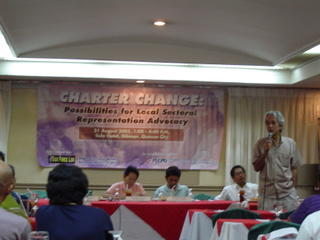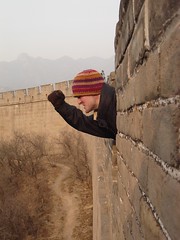Cha Cha
Well it had to happen – a political post. I am working in the government after all. And a hell of a lot of political rumblings have been going on in the Philippines since our arrival. Its really a wonder that a political post hasn’t appeared sooner! I guess what really prompted it is that I've been attending a number of seminars on Charter Change in the Philippines. On Tuesday it was, 'Charter Change: Will it Drive Economic Growth and Democratization?' and last week, 'Charter Change: possibilities for Local Sectoral Representation Advocacy’. Local Sectoral Representation, or rather advocating for the passage of an LSR bill through Congress is one of my tasks here at NCRFW. It’s been causing us a bit of grief, partly because it has been around for so long (I think over 10 years people have been pushing for an LSR bill) but also because of the current political situation. The forum was a chance to look more into the political implications of the proposed governance reform process on LSR advocacy and it was hosted by the LSR Task Force of which NCRFW is a member.

There has been a recent push in politics here to under go charter change, otherwise known as; 'cha cha' to reform the political system and move the Philippines from a unitary and presidential system of government to a federal and parliamentary one (like Australia’s for example). There has been a bit of a long history in the Philippines for cha cha, from Marcos through Ramos to the current Arroyo government. A lot of it has been about Presidents trying to stay in power (they are only technically allowed one term of 6 years), but it has also surfaced again lately due to recent political controversies – the Hello Garci tapes, alleged cheating in the latest election, ongoing juenteng, the 'self-exile’ of Gloria’s husband to the US, impeachment processes, and ongoing graft and corruption claims throughout the government.
The meeting was all in Tagalog so I only got a general understanding but one of the presenters, Dr Jose Rocamora, Executive Director of the Institute on Popular Democracy (IPD) gave a good speech with some great quotes such as:
- When talking about whether cha cha should go ahead, "Gloria has to face the music before we dance the cha-cha".
- When talking about the absence of strong political parties along with the desire to move to a parliamentary system where functioning political parties are essential, ‘it’s the age old question of which comes first, the chicken or the egg. In the Philippines we have our Pinoy answer, balut
For LSR, the recommendations weren’t so positive, but overall it was one of the more informative and useful advocacy meetings. Since the talk on cha cha has reignited here, and the realisation of how rotten politics are here in the Philippines, Neil and I both have been reflecting on the Australian system - which although has problems of its own, we think is a much more positive and responsive system than the one currently in operation here. I’ll be giving a bit of a talk on the Australian system to the staff at NCRFW as a practical example of a parliamentary, federal system and what the office may expect if cha cha goes ahead. At least my office mates and many Filipinos are engaging in the debate! It’s good to see, and a positive development.
Just to finish, I thought I would add something more about the context of Charter Change in the Philippines from a publication of the Citizens’ Movement for a Federal Philippines (CMEF) and the KC Institute of Federal-Parliamentary Democracy entitled, Charter Change for Good Governance: Towards a Federal Republic of the Philippines with a Parliamentary Government by Jose Veloso Abueva. I think it is a good introduction to why changes are necessary to improve governance in the Philippines.
”EDSA 1 and 2 : In a non-violent explosion of “people power” at EDSA [the main artery road in Manila] from February 22 to 25, 1986, tens of thousands of outraged but unarmed Filipinos gathered to defend a small but swelling band of military rebels. United in their anguished cry for ‘Justice, Freedom and Democracy’, they peacefully immobilized the armed forces of the 13 year Marcos dictatorship. On the forth day they banished the dictator into exile [interestingly, his daughter is now a House of Representatives member and his son, Governor].
“In January 2001, not only at ESDA in Metro Manila but also in many cities, citizens gathered and employed “people power” once more to bring down a president who was perceived to be abusive and corrupt. [Estrada – an ex-movie star. Interestingly his wife and son are both Senators in the 24-person national senate] Aggrieved citizens felt good once again, but “people power” alone could not bring us the good governance that we really need as a developing nation and democracy.
“We restored an outmoded system of democracy. The restoration of free elections and electoral democracy under the 1987 Constitution has not checked our pervasive problems of mass poverty, unemployment, corruption, social inequality, injustice, rebellion and the environment. Underdevelopment and population shill force legions of Filipinos to migrate [approximately 10% of Filipinos live and work overseas] as our country lags farther behind our advanced neighbors in the region. Political and economic power remains concentrated at the top of the social pyramid. . .
“We restored our adversarial separation of powers in a presidential system that daily creates conflict and gridlock between the Executive and Congress, with a vengeance. Our obsolete form of government and dysfunctional political parties sustain our politics of personality, patronage, cronyism and corruption without public accountability. . .
“We should recognize our glaring lack of ‘good governance’ which can be understood as the sustained, institutionalized capacity of the government to make the right decisions and policies and to implement them effectively to solve our problems and realize our goals. This gaping lack is what sets the Philippines apart from our progressive democratic neighbors (Japan, South Korea, Taiwan, Thailand) and our progressive semi-democratic neighbors (Singapore, Malaysia, China).
“Basically, good governance is the primordial responsibility of our national leadership. But since the mid-1960s we have suffered a collective failure of our political leadership to reform our institutions of governance for the common good. In spite of some good leaders here and there, most of our leaders have helped to preserve our traditional political system in which their power is rooted and nurtured.
“Pervasive poverty, insecurity and dependency, as well as lack of civic competence, compel many citizens to play their passive role in traditional politics. Our kind of capitalist or market economy also perpetuates our elitist political system. Moreover, the status quo of bad governance is sustained if we cannot build a deeper sense of nationhood, a stronger commitment to the common good and the national interest, spirituality, moral values, and modern ethical behavior. We need more of our reform-minded leaders in government, business and civil society to push for institutional reforms for good governance. We need responsible and reform-minded citizens in a growing middle class and a modern political culture. We need to break out of our vicious cycle of deficits in good governance and democracy.”





<< Home